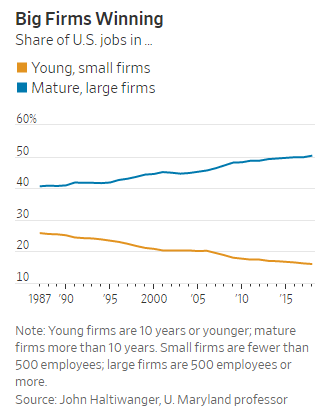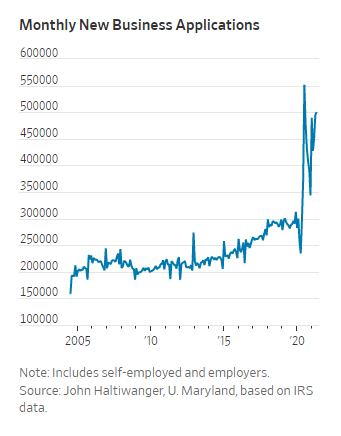

(p. A4) “Sixty or more years ago, most of us, including me, were altogether too willing to treat the economy as close to fully competitive. I now think that was a mistake,” Nobel Prize-winning economist Robert Solow said in a recent interview. “The economy has grown less competitive and the elements of monopoly power are probably very important for the distribution of income between work and wealth and ultimately across individuals.”
Douglas Holtz-Eakin, president of the American Action Forum, a conservative research group, said he is skeptical of the notion that corporate power has hurt consumers. He and other Republicans say the rise of big companies such as Walmart, Home Depot and Amazon has benefited U.S. consumers by helping to push down prices.
“I take all of this talk with a healthy dose of show me,” Mr. Holtz-Eakin said. While Republicans could likely get behind some of Mr. Biden’s proposals—such as pushing back against firms forcing workers to sign noncompete clauses or states imposing what some workers say are unnecessary licensing requirements on workers—other ideas may go too far.
Some research has found less cause for concern around business consolidation. “There are reasons to be cautious about concluding that market concentration has risen or is a meaningful problem for market competition and consumer welfare,” Nancy Rose, a professor in the economics department of the Massachusetts Institute of Technology, concluded in a 2019 examination of research on the issue, citing measurement challenges among reasons for skepticism.
. . .
With the rise of a few big companies, jobs also have become concentrated there. John Haltiwanger, a University of Maryland professor, finds that the share of U.S. jobs at young, small firms declined to 16% in 2018 from 26% in 1987. During the same period, the share of jobs in older, larger firms rose from 41% to more than half.
Mr. Haltiwanger’s research shows that the U.S. economy became less dynamic during this period, with fewer new jobs created by startup firms, less job-hopping by workers seeking out new opportunities and slower worker productivity growth.
. . .
Mr. Haltiwanger said the competition dynamics might now be changing due to the coronavirus pandemic. Tracking business identification data from the Internal Revenue Service, he spotted a surge in business formations in the second half of 2020, a trend that persisted into 2021.
“It is off the charts,” he said. “I think we discovered during the pandemic that our technological infrastructure is just phenomenal. We can do almost anything we want from anywhere. That leads to lots of market opportunities. I think there is going to be a surge of dynamism. The question is will it be transitory, or true innovation?”
For the full story, see:
(Note: ellipses added.)
(Note: the online version of the story has the date July 11, 2021, and has the title “Biden Stakes Out Position in Debate Over Power of Big Companies.”)

